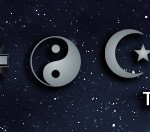KAYLIN ASKS:
What would sharia [Muslim law] look like if implemented? Would there be differences by country or region?
THE GUY ANSWERS:
Fundamental starting point: In principle, Islam draws no distinction between the spiritual and the secular such as Jesus’ famous biblical dictum “render therefore to Caesasr the things that are Caesar’s, and to God the things that are God’s.” It’s often said that Christianity centers on theology while Islam centers on law. Sharia (or “shariah”) covers personal morals (e.g. truth-telling), behavior (abstinence from alcohol), and religious duties (charity gifts, fasting, prayers, the pilgrimage) but also encompasses the entirety of existence.
In the following The Guy cannot begin to treat sharia regarding warfare, terror, and the current turmoil of political Islam in Egypt and elsewhere across the Mideast, Asia, and Africa. But in broad-brush terms, we’re currently witnessing a crucial global struggle within Islam over what sharia mandates, how to interpret and apply the legal tradition, and who has the right to do the interpreting and the applying. This pits rising activists, often figures like Osama bin Laden with thin religious credentials, over against traditional jurists and jurisprudence. The insurgents and amateurs not only hope to upend older authorities but challenge the substance of tradition, for instance discarding the ethical absolutes against kidnapping, suicide, murders of innocent civilians, or destruction of churches on grounds of political expediency.
Is this at all similar to modern Christian liberals’ moral relativism or “situation ethics”? You be the judge.
Meanwhile we see confusing international dynamics such as Saudi Arabia’s efforts to suppress the Muslim Brotherhood in Egypt. What gives, since both sides claim to cherish strict Muslim traditionalism? Iranian exile journalist Amir Taheri explains that not only did the Brotherhood try to murder a Saudi king (and later succeeded in murdering Egypt’s president to foster political turbulence) but the two sides adhere to rival schools of sharia.
It could take this great worldwide religion a century or more to sort all this out.
Amid all this perplexity, radical Islamists have turned “sharia” into a scare word in the West. As the head of the Church of England, Archbishop of Canterbury Rowan Williams, remarked in a 2008 lecture, “What most people think they know of sharia is that it is repressive towards women and wedded to archaic and brutal physical punishments.” The archbishop sparked outrage by musing about introducing voluntary use of sharia courts for certain issues as some kind of parallel jurisdiction to the civil law. The day afterward his office declared that he “certainly did not call for [introduction of sharia courts] as some kind of parallel jurisdiction to the civil law.”
In the U.S., a federal judge on August 15 abolished Oklahoma’s popular 2010 constitutional amendment that barred state courts fron considering sharia, saying this discriminated among religions without any “compelling state interest.” Meanwhile, laws that forbid application of foreign laws without specifying the obvious target of “sharia” have passed in Arizona, Kansas, Louisiana, South Dakota, Tennessee, and most recently North Carolina.
Sharia (Arabic for “path”) has two main sources. The Quran is understandably the most imortant since Muslims believe its oracles were given directly by God to the Prophet Muhammad. However, there’s far more legislation in the second source, the Sunnah, divinely guided deeds and words of Muhammad found in various collections known as Hadith. Those principles in turn were applied in new or ambiguous situations through rulings from recognized religious judges that constitute one of civilization’s great bodies of law.
Quran edicts are regarded as eternal and unalterable. That would include the ban on charging interest in commerce (2:275) and commandment that “the male shall inherit the equivalent of the share of two females (4:11). With thieves, “cut off their hands as punishment for what they did, as an exemplary punishment from Allah” (5:38). (Some Muslims say that means the hand should merely be cut, rather than “cut off.”) Controversial cases in the Sunnah prescribe, for instance, the death penalty for adulterers and (in one collection only) for Muslims who convert to other religions.
As for different countries, Kaylin will find answers in a July 25 Religion News service item noting categories defined by Jan Michiel Otto, a law professor in The Netherlands:
— Sharia has official status or heavy influence over all aspects of life in nations like Egypt, Afghanistan, Iran, Iraq, Pakistan, Saudi Arabia, and Yemen, as well as certain regions within pluralistic countries like Nigeria.
— In mixed systems, sharia generally covers family and personal law while secular courts under varied degrees of Islamic influence cover other matters, for example Algeria, Libya, Jordan, Kuwait, Malaysia, and Syria.
— In some Muslim-majority lands, sharia plays no official role, such as Turkey and the “stans” in Asia that were formerly part of the Soviet Union.
— Finally, some countries with Muslim minorities let religious courts handle family law, for example India, Israel, and several nations in East Africa.
Resources:
Religion News Service article:
www.religionnews.com/2013/07/25/shariah-101-what-is-it-and-why-do-states-want-to-ban-it
Council on Foreign Relations sharia briefing:
www.cfr.org/religion-and-politics/islam-governing-under-sharia/p8034
Archbishop’s lecture: search for “Civil and Religious Law in England”:
http://rowanwilliams.archbishopofcanterbury.org/articles.php/1137













